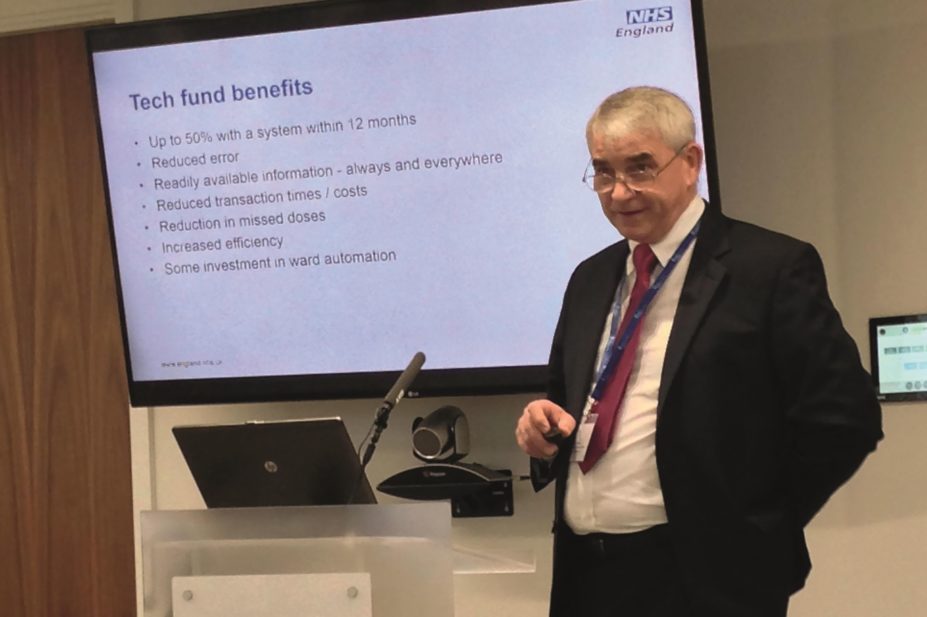
In 2013, health secretary Jeremy Hunt challenged the NHS to go paperless by 2018. The aim was to improve patient care, save money and give health professionals more time to care for an ageing population.
“It’s a stepwise progression,” explained Keith Farrar, clinical lead of the OPEN ePrescribing project for NHS England, speaking at a one-day conference on 1 December 2015 organised by the Pharmacy Informatics Forum. “First of all we need to have digital systems in place, and then once they are being used, they have to be integrated with other systems within, and then outside, your organisation. Care is much bigger than the NHS, we need to be more integrated in order to deliver [this].”
Progress so far
Now, coming to the end of 2015, 13% of hospitals in the UK have a fully implemented electronic prescribing and medicines administration (EPMA) system and 50% are in the process of implementation. “This is a massive jump,” explained Sarah Pontefract, a hospital pharmacist and doctoral research fellow at the National Institute for Health Research, also speaking at the conference. “Over the years there’s been a lot of guidance to facilitate hospitals to procure and reflect on e-prescribing, people did it a bit blindly 15 years ago but we’ve learnt lessons overtime and the NHS is committed to providing support for hospitals in implementing [e-prescribing].”
The conference, which was held at the Royal Pharmaceutical Society’s headquarters in Wapping, east London, gave attendees a clear idea of where the pharmacy profession now stands in terms of IT adoption. Speakers highlighted the challenges and benefits associated with implementing an e-prescribing system. They also offered support to those in the process of, or planning to start, procurement, implementation and use of IT systems for prescribing and medicines optimisation.
The £260m Safer Hospitals Safer Wards Technology Fund, now known as The Integrated Digital Care Fund, was set up by NHS England to support the progression from paper-based clinical record-keeping to integrated digital care records. It has helped to speed up the implementation of EPMA systems in hospitals across the country. Hospitals awarded the funding have monitored how they’ve used the money to deliver benefits to patients.
Benefits of EPMA
“You get readily available information,” said Farrar. “It’s always where you want it to be, when you want it.”
Transaction times are reduced, along with missed doses and there is increased efficiency, he said. “Many of the benefits are from reductions in error.”
Pontefract, who is exploring the impact of e-prescribing for her PhD, said the process could cut error rates by about 48%, although she said researchers have struggled to define medication errors. To tackle the question ‘what is a medication error’, Pontefract was involved in developing the iMPACT tool (Investigating Medication Prescribing Accuracy for Critical Error Types). This downloadable tool enables pharmacists and pharmacy technicians to review prescriptions by completing anonymised files for patients after medicines have been prescribed or administered.
“We have 12 trusts collecting these data, around 400 patients’ information and we can compare the impact of the system on the medication error rates but also the completeness of their prescription documentation. We therefore know the kinds of medication errors the system can prevent.”
How to implement EPMA
So what advice can those who have successfully implemented EPMA give to those considering doing the same?
“You need enthusiastic people,” said Iain Davidson, chief pharmacist at the Royal Cornwall Hospital near Truro.
This view was echoed by Richard Musk, lead pharmacist EPMA at Great Western Hospitals NHS Foundation Trust, which successfully bid for technology funding in 2014. “When selecting your project team pick the members appropriately; [you need] a can-do attitude,” he advised. “And know your organisation and who runs it – who do you need to get on board? At my trust we found that the matrons were the ones who we needed to win over, if they weren’t on board we were going to struggle no matter what we did.”
Both Davidson and Musk were closely involved in the planning and implementation of e-prescribing systems at their respective trusts and highlighted the benefits of multidisciplinary relationships and clear communication.
“[You need] buy-in from senior executives in the trust but it’s important to see that clinicians are also on board,” explained Musk, “[While planning] don’t just sit with your pharmacist or chief pharmacist, you need to have a whole range of stakeholders. It takes time and effort but if you organise it early on you’ll get benefits at the later stages.”
Making the most of the data
Davidson also emphasised making the most of e-prescribing data. “You’ve suddenly got this box full of fantastic information but you need to do something with it,” he says. “[I] strongly recommend anyone thinking of putting together an implementation team, to have an information analyst. Once you’ve got that you can unlock the information and get the service improvement that we all want.”
Davidson and Musk also drew on the challenges they had both experienced, such as the impact of a poor wi-fi network and the importance of communicating with IT colleagues early on. “Don’t leave it until the last minute, test as much as possible – you can’t start too early,” Musk recommended. “However, don’t underestimate business as usual. It’s an ongoing thing, [so you] need to [provide] support long term.”
As pharmacy moves into a paperless world, trusts need to draw on the experiences of others. But, as Musk highlighted, it’s important to be realistic in order to reap the benefits – each hospital is different even if their e-prescribing systems are the same. As Musk asks, “what do you want from your system and how are you going to achieve that?”

